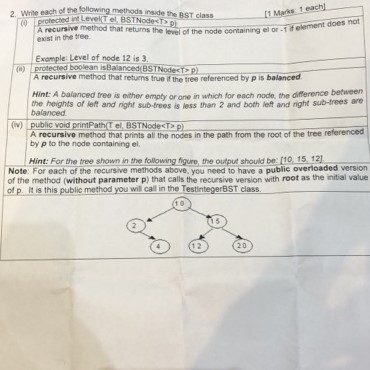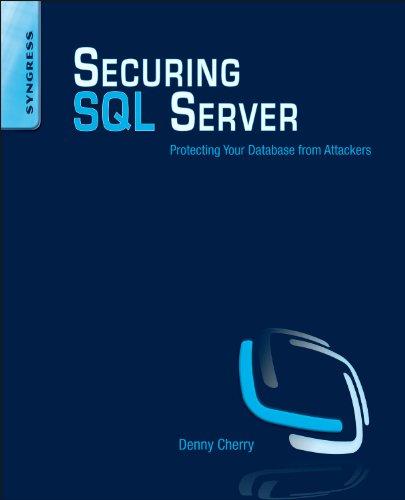Question
by using java this is bst class /************************ BST.java ************************** * generic binary search tree */ import java.util.*; public class BST > implements Iterable {

by using java
this is bst class
/************************ BST.java **************************
* generic binary search tree
*/
import java.util.*;
public class BST
protected BSTNode
public BST() {
}
public BST(BSTNode
root = p;
}
public void clear() {
root = null;
}
public boolean isEmpty() {
return root == null;
}
protected void visit(BSTNode
System.out.print(p.key + " ");
}
public T search(T el) {
return search(el, root);
}
//recursive search
protected T search(T el, BSTNode
if (p == null)
return null;
else if(el.compareTo(p.key )
return search(el, p.left);
else if(el.compareTo(p.key) > 0)
return search(el, p.right );
else
return p.key;
}
/*
//Iterative search
public T search(T el) {
BSTNode
while (p != null) {
if (el.equals(p.key))
return p.key;
else if (el.compareTo(p.key)
p = p.left;
else p = p.right;
}
return null;
}
*/
public boolean isInTree(T el) {
return search(el) != null;
}
public void breadthFirst() {
BSTNode
LLQueue
if (p != null) {
queue.enqueue(p);
while (!queue.isEmpty()) {
p = queue.dequeue();
visit(p);
if (p.left != null)
queue.enqueue(p.left);
if (p.right != null)
queue.enqueue(p.right);
}
}
}
public void preorder() {
preorder(root);
}
protected void preorder(BSTNode
if (p != null) {
visit(p);
preorder(p.left);
preorder(p.right);
}
}
public void inorder() {
inorder(root);
}
protected void inorder(BSTNode
if (p != null) {
inorder(p.left);
visit(p);
inorder(p.right);
}
}
public void postorder() {
postorder(root);
}
protected void postorder(BSTNode
if (p != null) {
postorder(p.left);
postorder(p.right);
visit(p);
}
}
public void insert(T el) {
root = insert(el, root);
}
protected BSTNode
if( p == null )
p = new BSTNode
else if(el.compareTo(p.key )
p.left = insert(el, p.left );
else if( el.compareTo(p.key ) > 0 )
p.right = insert(el, p.right );
return p;
}
/* iterative version
public void insert(T el) {
BSTNode
while (p != null) { // find a place for inserting new node;
prev = p;
if (el.compareTo(p.key)
p = p.left;
else p = p.right;
}
if (root == null) // tree is empty;
root = new BSTNode
else if (el.compareTo(prev.key)
prev.left = new BSTNode
else prev.right = new BSTNode
}
*/
public void delete (T el) {
root = delete (el, root);
}
//recursive delete by copying
protected BSTNode
if (p == null)
return null;
else if (el.compareTo(p.key)
p.left = delete(el, p.left); // delete from left
else if (el.compareTo(p.key) > 0) //target is greater than p.key
p.right = delete(el, p.right);
else { //p.key is the key to be deleted
if (p.left == null || p.right == null) {//if there is one or no child
if (p.left == null) //if no left child
p = p.right;
else //if no right child or no child at all
p = p.left;
}
else { //if p has two children
BSTNode
p.key = tmp.key; //replace p.key with its successor
p.right = delete(tmp.key, p.right); //delete the successor from the right subtree.
}
}
return p;
}
//given a non-empty tree, retuns the node with the minimum key.
private BSTNode
BSTNode
while (tmp.left != null)
tmp = tmp.left;
return tmp;
}
//Iterative delete by copying
/*
public void deleteByCopying(T el) {
BSTNode
while (p != null && !p.key.equals(el)) { // find the node p
prev = p; // with element el;
if (el.compareTo(p.key)
p = p.left;
else p = p.right;
}
node = p;
if (p != null && p.key.equals(el)) {
if (node.right == null) // node has no right child;
node = node.left;
else if (node.left == null) // no left child for node;
node = node.right;
else {
BSTNode
BSTNode
while (tmp.right != null) { // 2. find the rightmost
previous = tmp; // position in the
tmp = tmp.right; // left subtree of node;
}
node.key = tmp.key; // 3. overwrite the reference
// to the element being deleted;
if (previous == node) // if node's left child's
previous.left = tmp.left; // right subtree is null;
else previous.right = tmp.left; // 4.
}
if (p == root)
root = node;
else if (prev.left == p)
prev.left = node;
else prev.right = node;
}
else if (root != null)
System.out.println("el " + el + " is not in the tree");
else System.out.println("the tree is empty");
}
*/
public Iterator
return new BSTIterator();
}
private class BSTIterator implements Iterator
BSTNode
LLQueue
public BSTIterator() {
queue = new LLQueue
queue.enqueue(p);
}
public boolean hasNext() {
return !queue.isEmpty();
}
public T next() {
p = queue.dequeue();
if (p.left != null)
queue.enqueue(p.left);
if (p.right != null)
queue.enqueue(p.right);
return p.key;
}
public void remove() {
// not implemented
}
}
//Generic BSTNode class;
private class BSTNode
protected T key;
protected BSTNode
public BSTNode() {
left = right = null;
}
public BSTNode(T el) {
this(el,null,null);
}
public BSTNode(T el, BSTNode
key = el; left = lt; right = rt;
}
}
}
2 Write each of the following methods inside the BST class 11 Marks 1 eachl not element does A recursive method that returns the level of the node containing el or -1 i exist in the tree Exomple: Level of node 12 is 3 A recursive method that retuarns true if the tree referenced by p is balanced (n) protected boolean isBalanced (BSTodeT p) betweern Hint: A balanced tree is oither empty or one in which for each node,the difference bet the heights of left and right sub-trees is less than 2 and both lett and rightsub-es balanced (iv) public void printPath(T el, BST NodeTyp) A recursive method that prints all the nodes in the path from the root of the tree referenced by ? to the node containing el. Hint: For the tree shown in the folowing figure, the output should be: t0, 15, 12 Note: For each of the recursive methods above, you need to have a public overloaded version of the method (without parameter p) that calls the recursive version with root as the initial value of p It is this public method you will call in the TestintegerBST class. 1 2 20 2 Write each of the following methods inside the BST class 11 Marks 1 eachl not element does A recursive method that returns the level of the node containing el or -1 i exist in the tree Exomple: Level of node 12 is 3 A recursive method that retuarns true if the tree referenced by p is balanced (n) protected boolean isBalanced (BSTodeT p) betweern Hint: A balanced tree is oither empty or one in which for each node,the difference bet the heights of left and right sub-trees is less than 2 and both lett and rightsub-es balanced (iv) public void printPath(T el, BST NodeTyp) A recursive method that prints all the nodes in the path from the root of the tree referenced by ? to the node containing el. Hint: For the tree shown in the folowing figure, the output should be: t0, 15, 12 Note: For each of the recursive methods above, you need to have a public overloaded version of the method (without parameter p) that calls the recursive version with root as the initial value of p It is this public method you will call in the TestintegerBST class. 1 2 20Step by Step Solution
There are 3 Steps involved in it
Step: 1

Get Instant Access to Expert-Tailored Solutions
See step-by-step solutions with expert insights and AI powered tools for academic success
Step: 2

Step: 3

Ace Your Homework with AI
Get the answers you need in no time with our AI-driven, step-by-step assistance
Get Started


